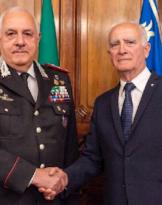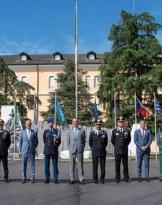We have seen them so many times in action in films and TV series that we feel like we have always known them... but in reality, what do we know about the organization of the work of the "COPS"; US cops? And how does their training happen?
I wanted to delve deeper into these topics for "Defense Online", trusting in the friendliness and availability of two of the main police departments in the United States: that of Los Angeles (LAPD) and that of New York (NYPD): they responded within a few hours (!) to the questions. After all, the first amendment to the Constitution of the United States of America protects various fundamental freedoms, including that of the press (without government interference).
The work of the police officer
The type of services offered by the American police for the safety and protection of citizens is very broad and, as will be seen in the chapter on training, being a policeman represents a safe occupational investment due to the various professional experiences it allows. This is despite the fact that the concept of does not exist in the USA permanent employment, being a country that places no barriers to every citizen's desire for growth; so the experience of the uniform may only concern a part of an individual's working life.
Being part of the police, which is a public service guaranteed both by the central government of the United States and by the various levels of local communities, has at its basis some ethical principles that are deeply felt - at least in theory - by all American citizens: theobligation of sincerity (lying is considered the most serious of shortcomings) and the collaboration rather than repression (you may encounter an agent or a sheriff helping to change a tire on an endless road in the middle of nowhere). This causes towards police officers, or Police Officers, is perceptible to the public respect for the uniform and not the fear of it, as happens in less developed countries.
Training in academies
In the USA, every police department is subject, let's remember, to different jurisdictions based on the states they belong to, so our investigation will analyze how recruitment and training takes place in two opposite points of the territory, Los Angeles and New York.
 Every large city in a state has an officer training school and, in the Los Angeles Police Department better known as LAPD, the minimum entry age is 20, but at 14 you can already be part of the program Cadets of the LAPD for community service.
Every large city in a state has an officer training school and, in the Los Angeles Police Department better known as LAPD, the minimum entry age is 20, but at 14 you can already be part of the program Cadets of the LAPD for community service.
The initial background is not simple, but there are other possibilities to gradually access the role of officers, for example volunteering or ACOs Associate Community Officer, that is, the Department's work assistants, rather than the 911 Dispatcher PSR Police Service Representative, the emergency switchboard workers.
Throughout the USA, the only number 911 (nine-eleven) receives every emergency call. In New York the NYPD has job positions to assist the Department and Cops such as: traffic control and school safety officer, vigilant at intersections, telecommunications technician, and state control of properties in the area.
Schools are a cross between a campus and a barracks; here the physical preparation is hard and constant, there are small rooms for studying and resting, and each officer is trained in many activities, from traffic management to driving a "patrol". The focus of police academies is primarily focused on the practical aspects of the profession. The duration of the courses is variable, on average it is around six months, a little less for ex-servicemen. Attendance is generally free for recruits already hired, but in certain cases the payment of a fee may be required.
Personal merit
To facilitate this life-changing choice, insurance is also extended to the cadets' family members.
 Training continues even after the academy in the specific roles assigned, but the initial information base is already very complete. The concept of competition and sport has been deeply rooted since childhood in the USA and, also based on the results of physical tests, the most suitable role for the future agent is determined.
Training continues even after the academy in the specific roles assigned, but the initial information base is already very complete. The concept of competition and sport has been deeply rooted since childhood in the USA and, also based on the results of physical tests, the most suitable role for the future agent is determined.
In Anglo-Saxon countries it is important to have references and presentations, a different component from our "recommendations"...
As in every course there are those who are better than others. A general characteristic of working in the US is that if you are not fit or capable of doing something, you are told directly and taken out of context. This increases efforts and competitiveness because not passing the test would be a heavy defeat to digest.
In the classroom, before or after outdoor activities, the captain or an expert sergeant which begins with a cordial: Good morning company! While seated, the students or cadets respond in chorus: Good morning Sir! There doesn't seem to be the iron formality of military units, rather a scholastic spirit which however requires active participation and order.
In addition to the assignment of a department which in Los Angeles can be the metropolitan sector, the Metro Division or the CHP California Highway Patrol, it may happen that you have the characteristics for the assignment in the Special Weapons And Tactics, the leatherheads present in the US police forces, but this can only happen after a few years of seniority. In any case, there are as many as 250 specializations in the LAPD such as: motorcyclists, divers, helicopter pilots, mounted officers e K-9 unit, anti-explosive dog handlers, etc.
Inclusion and professionalism

The growth of the cadet is always followed by a tutor. Training in the New York police has for years been linked mainly to the classroom and much less to field practice, but in the last 10 years it has radically changed. Much has been invested in the NYPD Academy at College Point in Queens, pairing recruits with experienced officers or FTOs: Field Training Officers.
The aspect that catches the eye when looking at the names of the recruits in the two bodies is that the many Italian Americans in the ranks of the police have passed the baton to US citizens of Latin American origin (see video at the bottom).
The environment is very inclusive and gives importance to education and the study of the Spanish language, having to prepare personnel who work in a metropolis that has important problems and is an international hub. Consider that it is expected in the NYPD training "LGBTQ training" and, among the many specialties of the agents there is even training for the administration of Naloxone, a life-saving drug which by canceling the effects of an opioid overdose makes an arrest manageable. We could use a doctor here.
The idea that the reader will have and that I also have is that in the USA the police changes their operational attitude based on the state in which they operate, a state which can have completely opposite guidelines to another despite having to observe the laws of the Central government.
Also within the NYPD is the Driver Education and Training Unit, which provides 31 teaching courses on approximately 20 different types of vehicles before issuing the specialized license.
(Go on)
Images: LAPD/NYPS












